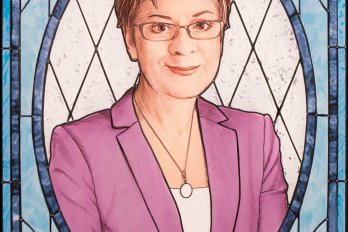The median sale price for a house in Vancouver is about $750,000—making the city Canada’s most expensive real estate market by far. How do middle-class firefighters, teachers, and business owners pay that sum off on an average individual income of $43,000?
The answer is, they don’t. They rent. Or bunk up in someone’s basement. Or move to a distant suburb.
If they do buy in, it’s often with their parents’ money. Which means the system shuts out extended families lacking accumulated wealth—thereby locking in the socio-economic status quo. This is not how a healthy real estate market works. This is not how a healthy society works.
Why Vancouver? Why not Toronto, Montreal, Calgary, or Halifax? As Kerry Gold explains in our cover story, the answer isn’t complicated: the city’s real estate market has become a speculative playground for wealthy Chinese immigrants looking for a safe place to park their capital while still living on the other side of the Pacific. As a result, some neighbourhoods have become ghost towns, largely stripped of street life. Again: not how a healthy society works.
“Global money is boosting Vancouver’s prices, and local dollars can’t compete,” Gold writes. Much of the cash, she notes, appears connected to the movement of illegal currency. “Most troubling is that homeowners are now selling directly to buyers in China, listing their homes in real estate exhibitions in Beijing and Shanghai . . . . Average-earning buyers are being entirely cut out of the purchasing loop.”
Canada has a shameful legacy of anti-Asian racism. This helps explain why Andy Yan’s groundbreaking 2015 report on foreign buyers in Vancouver—the statistical basis for Gold’s analysis—was greeted with headlines such as “Foreign ownership research prompts cries of racism.” Mayor Gregor Robertson suggested Yan was turning his findings into a “race issue.” (The city, meanwhile, has done nothing to address the problem.) An urban planner expressed worry that Yan’s research would incite “racism” and “intolerance.”
But Yan’s research isn’t racist. He focuses not on the colour of homebuyers’ skin but on the massive economic distortion that results when billions of dollars get mainlined into a geographically concentrated real estate market. The scope of distortion would be identical if these buyers hailed from Kuwait, Norway, or Seattle.
It’s troubling that a prominent left-wing politician such as Robertson—a former NDP member of the provincial legislature who has a strong social-justice resumé—would prefer to stare at his shoes and offer bromides about tolerance rather than meaningfully engage with a phenomenon that affects every one of the 2.1 million people living in the Greater Vancouver Area. His overriding concern, shared by the media, is to avoid any hint of political incorrectness.
In this way, Robertson exemplifies a larger trend: a narrow fixation on identity politics has compromised the left’s traditional focus on wide-angle issues of socio-economic stratification, poverty, and income inequality.
This is a critical period in the history of the Canadian social contract. The labour movement continues to disintegrate. The sharing economy threatens the livelihoods of taxi drivers and hotel staffers. Driverless cars and other robotic technologies will soon extinguish whole fields of work. Full-time employment is being replaced by contract positions. Entry-level journalists laugh mirthlessly when I ask if they ever plan to buy a house. Most of them can’t even afford to ante up for RRSPs.
The left now has a golden opportunity to push for bold policies that would go to the heart of income inequality in our class-based society: guaranteed income, universal access to care for those suffering from mental illness, and, yes, tax and regulatory policies that discourage hot money from overinflating local real estate markets. But from what I’ve read on social media and in Walrus editorial submissions, many activists and pundits seem far more comfortable striking positions on highly compartmentalized identity-politics issues that can be reduced to succinct, tweet-able messages. Accusations of racism, sexism, and homophobia, in particular, can encourage a pack mentality—and so politicians such as Robertson are (understandably) terrified of arousing accusations that they harbour impure thoughts.
Consider this longitudinal case study: a generation ago, opposition to the Canada–United States free-trade deal and NAFTA were the dominant obsessions of the Canadian left. And rightly so. Globalization has revolutionized our economy, creating whole new classes of winners and losers. By contrast, news of last year’s Trans-Pacific Partnership—the largest trade deal in history—was treated for the most part as an obscurity. Progressive media were far more interested in culture-war battles over the likes of #OscarsSoWhite, niqabs , and Donald Trump. Important Canadian stories with enormous economic impact continue to get short shrift.
That includes the story of how a flood of overseas money has made Vancouver all but unlivable. And I hope Kerry Gold’s reporting finally spurs policies that help poor and middle-class Vancouverites find a lasting place in their city.
This appeared in the May 2016 issue under the headline “Vancouver’s Offshore Problem.”






